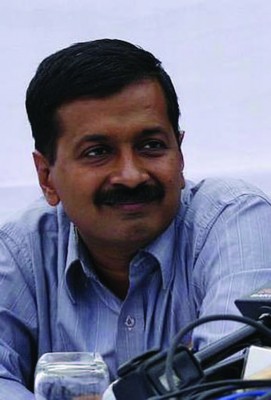NEW DELHI (TIP): Soon after announcing the party’s intent of forming the government in Delhi, Aam Aadmi Party leaderArvind Kejriwal met Lt Governor Najeeb Jung. “I told the LG that AAP is ready to form government. LG told me he will send the proposal to President and get back after his direction,” Kejriwal said. The swearing-in ceremony will take place at Ramlila Maidan on December 28. The party took the decision to form the government at a meeting of political affairs committee after analyzing the results of the public referendum it had carried out in the last few days on the issue.
Arvind Kejriwal, who led the debutante party to a spectacular victory in the polls winning 28 seats in the 70-member assembly, will be the chief minister of Delhi, party leader Manish Sisodia said. “We were called by the LG to discuss government formation on December 14. We had sought time to take a decision as ours is a party of common people and we want to their views. “We got responses from the citizens through website, phone calls, SMS and by holding public meetings and most of them favoured government formation by AAP. We are now going to give the letter to LG saying that AAP is ready to form the government,” Kejriwal told reporters at AAP’s office in Kausambi here, some time ago. He said the party held 280 public meetings across Delhi and in 257 such gatherings people favoured formation of government by the party while the rest opined that they it should not take powers.
There has been deadlock over government formation in Delhi for nearly two weeks after the announcement of the results on December 8. AAP has 28 seats while Congress with 8 has agreed to give outside support. BJP is the single largest party with 31 seats in its kitty. A civil servant-turned-politician, 45-yearold Kejriwal had himself participated in scores of meetings in the last one week to know people’s views on government formation. The debutante party was under pressure to form government after BJP refused to do so and Congress wrote to Delhi lt governor about giving unconditional support to AAP to form the government. Earlier, both Congress and BJP had attacked AAP for refusing to form the government, saying it was shying away from the responsibilities knowing that it cannot fulfil the promises like cutting the power tariff by 50 per cent and providing 700 litres of free water daily to each household in the city.
After the results of the polls were out, AAP had ruled out taking support of any political party to form the government, saying it will play the role of a “constructive opposition”. Asserting that there was no confusion over the chief ministerial candidate, Sisodia said Kejriwal has been party’s choice for the top post. “There were rumours about who will be the chief minister. AAP had said earlier that the party would contest election with Arvind Kejriwal as CM candidate. Then in our manifesto also we have reiterated this. After the election results were out, he was elected as the leader of the legislative party. So Arvind Kejriwal will be the chief minister,” Sisodia said. To criticism about holding public meetings on the issue, Kejriwal said unlike other parties, AAP wants participation of public on important issues and to bring real democracy.
AAP, which made an electrifying debut in the polls, was formally launched on November 26, 2012. It came into existence following differences between Kejriwal and Hazare regarding whether or not to politicise the popular India Against Corruption(IAC) movement that had been demanding a Jan Lokpal Bill since 2011. Hazare preferred that the movement should remain apolitical while Kejriwal felt the failure of the agitation route necessitated a direct political involvement. The AAP has led several protests since its formation. Among these was a campaign against an alleged nexus between government and private corporations relating to price rise for electricity and water in Delhi. Another saw the party demanding justice for victims of sexual harassment and rape, including the introduction of a stronger anti-rape law. Hazare and Kejriwal made it known on September 19, 2012 that their differences regarding a role in politics were irreconcilable. Kejriwal had support from some wellknown people involved in the anti-corruption movement, such as Prashant Bhushan and Shanti Bhushan, but was opposed by others such as Kiran Bedi and Santosh Hegde.
